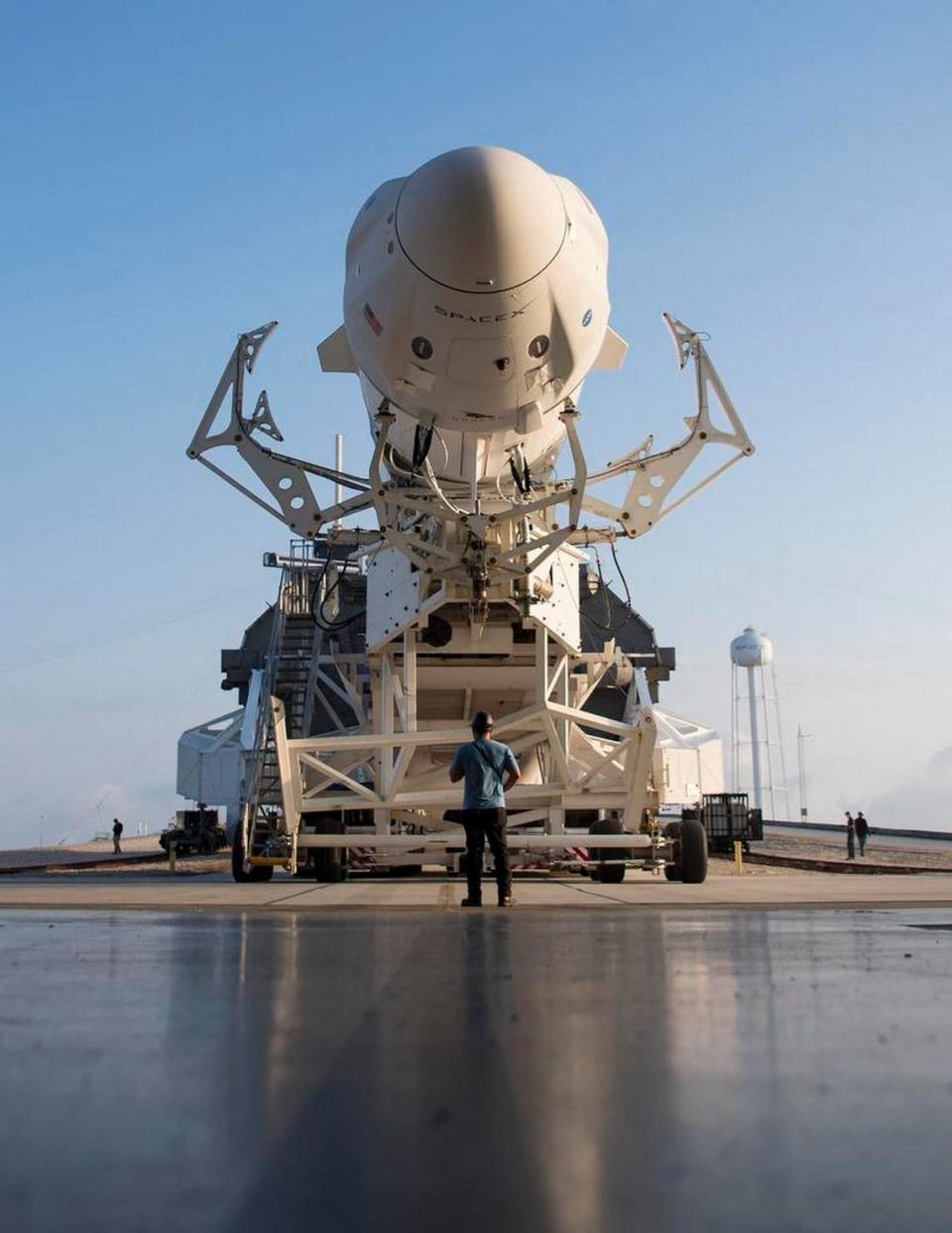‘Finders keepers’ doesn’t apply to space junk that may land in your Florida yard
A warning to Floridians: If a piece of the latest SpaceX rocket falls into your yard, call the police — or else.
Under a bill passed by lawmakers Monday, Floridians would face charges for not turning over parts of rockets or other man-made space debris that fall onto their property or wash up on their beach.
If you find an object that “reasonably” looks like a space part on your lawn and don’t report it to police, you could be subject to a new first-degree misdemeanor and up to a $1,000 fine, plus restitution to the owner of the part.
The bill is now heading to Gov. Ron DeSantis’ desk with backing by SpaceX, run by founder and CEO Elon Musk. The company has been launching from Cape Canaveral for years. On Friday, its Falcon 9 rocket carried four astronauts from NASA’s Kennedy Space Center to the International Space Station.
Although NASA rockets and shuttles have been blasting off from Florida for decades, the changing nature of spaceflight has made it more important to recover fallen parts, said lawmakers and a lobbyist for SpaceX.
Because SpaceX is reusing rockets and other parts to dramatically reduce the cost of spaceflight, it’s more dependent on recovering parts and pieces. Plus, because private companies such as SpaceX have taken over from NASA on a variety of spaceflight duties, companies don’t want to lose what might be valuable design secrets.
SpaceX lobbyist Jeff Sharkey told a House committee last month that the company feared losing intellectual property to China.
“This bill, which seems trivial, is extremely important,” Sharkey said.

Rep. Tyler Sirois, R-Merritt Island, whose district includes Cape Canaveral, said recovering spacecraft parts is an “increasingly common issue in Florida.”
“In my district, when the Challenger was lost, pieces of the orbiter were washing up on our beaches,” he told lawmakers last month.
He also pointed to the case last year of a fisherman reeling in two red parachutes and a hatch door used by SpaceX 32 miles off the coast of Daytona Beach. (The fisherman reported it to SpaceX.)
Sirois said the bill was not intended to recover nuts and bolts but items that are clearly marked as belonging to spacecraft.
And it’s particularly focused on stopping people from reselling the items. He cited reports of people trying to sell debris from the 2003 space shuttle Columbia disaster on eBay. Selling those items is illegal under federal law. In 2000, an Ohio man pleaded guilty to theft of government property for trying to resell a piece of the space shuttle Challenger 14 years after it exploded off the Florida coast.
“What we don’t want is for it to end up for sale or in the hands of a competitor country,” Sirois said. “We want these materials to be returned to people who launched it.”
On Monday, the Senate voted unanimously to send the bill to DeSantis’ desk, where it will become law unless he vetoes it. The bill takes effect July 1.
Florida would be the first state to adopt a law requiring people to report such items to police, Sirois said.
Under House Bill 221, someone who locates debris “reasonably identifiable as a spaceflight asset must report the description and location” to their local police.
The bill defines a “spaceflight asset” to include “crewed and uncrewed capsules, launch vehicles, parachutes and other landing aids, and any ancillary equipment that was attached to the launch vehicle during launch, orbit, or reentry.”
Once contacted, the police must then make a “reasonable effort” to identify the owner of the part and “promptly” notify them. The bill allows the owner to enter private property to recover the part if police believe “exigent circumstances” exist: whether the part presents “an immediate danger to public safety” or if there’s a danger the part will be damaged or destroyed.
Someone who finds the part can’t keep it, sell it or refuse to turn it over to police. If they do, they could be charged with a new misdemeanor: “misappropriation of a spaceflight asset.”
While the bills have sailed through committees, some lawmakers have raised questions.
“We’re now in a very weird situation where something that drops in my backyard, I have a duty to return it. And if I keep it, I’m being charged with a crime,” Sen. Jason Pizzo, D-Miami, said during a committee meeting. “It’s a very new and novel area.”
Pizzo, a former prosecutor, raised another concern about the bill. Stealing anything worth more than $750 is considered grand theft in Florida, a third-degree felony. If the space part is worth more than $750, would the person be subject to grand theft as well as the misdemeanor for not turning it in?
Sirois said those decisions would be up to local prosecutors.
Ultimately, he said the bill was about making Florida more hospitable to aerospace companies, and he didn’t see many Floridians being subject to the new law.
“Floridians have aerospace in their blood. It’s part of their ethos in the state,” he said. “I think people will recognize the duty to return these items to their owner.”

